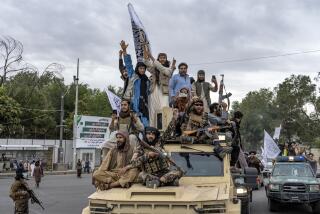Afghan president to eliminate private security within 4 months
- Share via
Reporting from Kabul, Afghanistan — President Hamid Karzai will shut down all private security firms operating in Afghanistan within four months, his spokesman announced Monday, sending ripples of alarm through a Western community that relies heavily on such protection.
The Afghan leader had said for months that he intended to call a halt to the operations of private security firms, which are not regulated by the Afghan government and have long been a source of friction between the Karzai administration and the West.
In announcing a fairly near-term deadline for the shutdown, the president appeared to preempt efforts by NATO’s International Security Assistance Force to register private security contractors and set standards for their behavior.
The deadline could be used as a bargaining chip by Karzai in the dispute over corruption in his government. Those tensions escalated when the president recently moved to assert control over two Afghan bodies responsible for tackling fraud and graft, after the home of a senior Karzai aide suspected of bribery was raided.
Dozens of private security companies, some foreign and some Afghan, are thought to have a workforce numbering around 40,000 people. They vie for billions of dollars in contracts, many handed out by the U.S. military.
Western officials have expressed agreement in principle with Karzai’s demand to rein in the security contractors, but the timetable — if adhered to — could cause serious problems for foreign firms, diplomatic missions, the North Atlantic Treaty Organization force and others.
All over the capital, international organizations, together with restaurants, hotels and guesthouses frequented by foreigners, are surrounded by high concrete blast barriers and, almost invariably, private guards.
Karzai has said Afghan security forces would take up the slack, but few here consider the Afghan police and army ready to shoulder the burden of providing general security. And even with the troop buildup ordered by President Obama, which is nearing completion, Western military forces are already spread thin.
The U.S. Embassy, which makes use of private security, declined to comment on the decree “until we have seen and studied it,” spokeswoman Caitlin Hayden said. She added that the U.S. “supports President Karzai’s intent.”
Karzai’s spokesman, Waheed Omar, told reporters in Kabul on Monday that “within four months, all private security companies will be disbanded.” Nine days earlier, Karzai had made a speech pledging to scrap private security firms, but he did not set a deadline.
As also happened in Iraq, security contractors in Afghanistan periodically have stirred public fury with incidents that have left civilians dead and injured. In theory, they are subject to Afghan law, but at times they have been whisked out of the country when prosecution looms.
At the end of July, a traffic accident involving contractors from DynCorp International that killed four Afghans fueled anti-American protests in Kabul.
Karzai’s move appears to have taken Western officials by surprise.
Hours before Omar’s announcement, a Western military spokesman, Brig. Gen. Josef Blotz, offered an update on actions of a military task force set up in June to provide oversight of private security firms.
Blotz told reporters the transition away from contractors and to the Afghan army and police would “happen over time.”
laura.king@latimes.com
More to Read
Sign up for Essential California
The most important California stories and recommendations in your inbox every morning.
You may occasionally receive promotional content from the Los Angeles Times.










